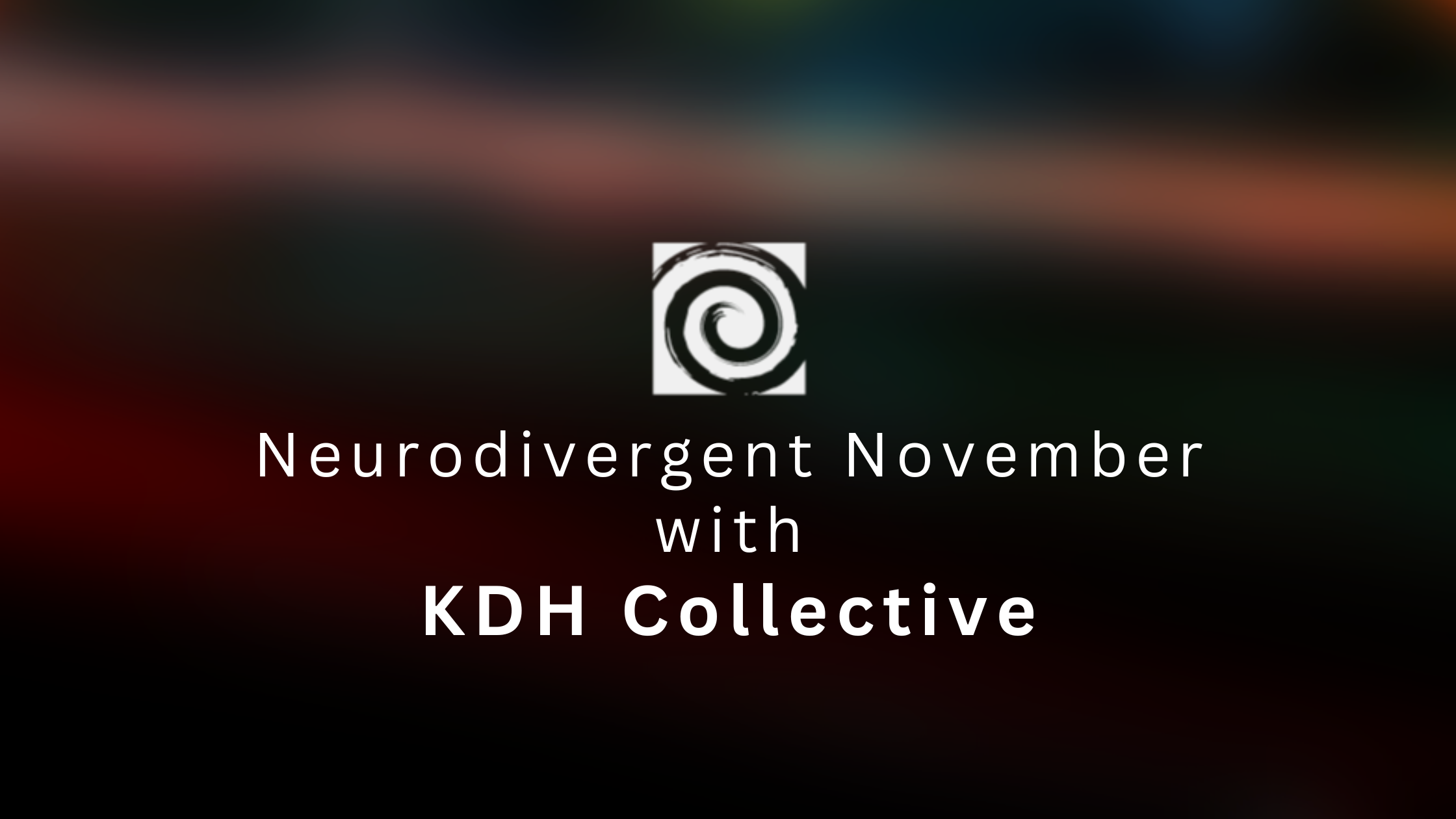Neurodivergent November with KDH Collective
The beauty of being the KDH Collective, a group of neurodivergent clinicians and scholars, is that we have the unique ability to and intense passion...
9 min read
).png) Whitney Storey, MS, LPC
:
Jun 20, 2025 11:58:37 AM
Whitney Storey, MS, LPC
:
Jun 20, 2025 11:58:37 AM

As mental health therapists, we are trained to understand and address distress and to help our clients navigate their inner worlds and external challenges. But how often do we truly pause to examine the foundational lenses through which we view "health," "function," and "disability"? Our understanding of these concepts is often implicitly absorbed and explicitly shifted during our upbringing, education, and training, and it profoundly shapes our assessment, our interventions, and ultimately, our clients' therapeutic journeys. Our implicit and explicit beliefs about health and function - of wellness - guide our treatment planning and our expectations for success as therapists, clients, and people in our society.
My overwhelming majority of my clients are Autistic, and I can't help but see how their presenting problems are so wrapped up within a tangle of beliefs, from their families, friends, society, and from us as helping professionals, all of which is deeply influenced by the history of and cultural specificities around wellness.
With this blog, my aim is to do that work, beginning by unpacking the historical roots and contemporary implications of the medical (or deficit) model of health alongside the social disability model. Our ideas of "normal" has guided our work, leading to assumptions that can inadvertently dehumanize and restrict, even when our intentions are to help. So let us explore how these frameworks define everything from "function" to "cure," and why moving beyond a binary understanding is not just theoretical, but essential for truly affirming and effective practice. The ultimate destination for our blog together is to explore what a truly neurodiversity affirming model of therapy is and why a shift in perspective can not only transform our work with Autistic and other neurodivergent clients, but ultimately benefit everyone in the systems we touch.
To truly appreciate the need for new perspectives, we must first understand the historical foundations of our current views on disability and health. Our modern understanding is deeply rooted in 19th-century thought, particularly the rise of IQ theory and a broader societal drive to classify, control, and regulate the human body.
This era saw the emergence of what we now call the medical model, often synonymous with the deficit model or individual model of health. Within this model, the issue or problem to be solved in treatment is said to be within the person - some deficit or deficiency about the person that requires fixing. This framework defines "function" by statistical and cultural ideals, emphasizing concepts like independence, economic productivity, and sociability as benchmarks. Consequently, the focus of "health" within this model is heavily centered on adhering to these norms.
The primary aims of the medical/deficit model are clear: to prevent deviation from and move one closer to an ideal state of being (which is inherently culturally based), and to provide "help" through interventions like medication, assistive devices, or even legal protections. The underlying goal is often to "cure" or, at the very least, enable individuals to "pass for normal". Within this paradigm, personal experiences and accounts of lived experience are primarily valued for their ability to be compared to these norms, serving as a gauge of how well a "cure" is progressing.
Through this lens, therapeutic treatment for Autistic clients is focused on goals like improving social skills, seeking employment, decreasing their emoting in ways that feel too intense (e.g., meltdowns), and making the Autistic person fit into "normal" society as much as possible. In practice I often see this in a couple of main ways with my clients: first, they often share pressure from loved ones to find full time employment, for example, and second, they often share deep shame for their inability to manage full time work with all of the other demands of independent living. This is precisely why approaches like Applied Behavioral Analysis (ABA) and organizations like Autism Speaks have faced significant criticism and even outright rejection within the Autistic community – they are perceived as striving for normalization rather than affirmation.
Because this system centers the problem to be fixed, it also implicitly (and at times explicitly) puts the burden of getting better onto the individual themselves. Buck up! Pull yourself up by your bootstraps! With Autistic clients, this looks like continued praise for overworking, expectation of high levels of (socially normalized) success regardless of its cost, and a common trajectory of what adulthood and independence looks like. And deep shame. In a story that feels too close to home to me as a late diagnosed Autistic person, many of my clients come to me with unimaginable autistic burnout, deep sadness, and at times suicidal thoughts and actions. They have heard the message that they are not right and should be working harder to be "normal" loud and clear.
This system of understanding wellness also created a system of classification that serves a societal function: distinguishing between the "worthy" and "unworthy" poor. The deficit model continues to operate as a means of social control within our contemporary welfare systems. It's a system where power is gained by those who classify over those who are classified, stemming from the Industrial Revolution's demand for speedy, efficient, and conformist workers. The day of working 9-to-5 is long over, with many of us starting work much earlier than 9, working more than one job, and often the kinds of jobs that follow us home and weigh our bodies down. Work, in the traditional sense, is the ultimate goal. We ask preschoolers what they want to be when they grow up, and when meeting new people in adulthood, we often start with "what do you do?"
While the research is limited, the existing literature states that between 15-30% of Autistic adults are capable of working a full time job.
If the medical model places the "problem" within the individual, the social model of disability offers a radically different perspective. Here, function is seen as variable, and that this is not only normal, but inherently good. Like diversity in the animal kingdom leading to improved health and survival of the species, diversity in humanity is also what makes our species survive and thrive. The real barriers to the function of diverse people, according to this model, stem from society's rigid adherence to and insistence on culturally defined values. It argues that society, not the individual, is "disabled" by its inability to accommodate diversity.
This profound shift in understanding didn't happen overnight. It was forged through persistent advocacy and activism by disabled people and their loved ones, who fundamentally changed our collective understanding of disability. Trailblazers in disability advocacy and studies, including Mike Oliver, Jenny Morris, Tom Shakespeare, and Susan Wendell, alongside Lennard Davis, played crucial roles in leading conversations towards disability politics.
These scholars and activists were instrumental in explaining how the very concept of disability arose as a tool of the 19th-century industrial era. Essentially, what we now call "disability" was, in many ways, a social construct designed to sort and control a workforce, a system that continues to impact our societal structures today.
The social model demands that we recognize and address systemic barriers, rather than focusing solely on individual "deficits." It highlights how personal accounts and lived experiences are not just comparative data points, but are, in fact, vital guides for research and social action. This is why neurodivergent self-advocacy is so crucial, echoing the powerful movements for gender, civil, and LGBTQ+ rights, and upholding the rallying cry, "Nothing about us without us."
It was within this evolving landscape that sociologist Judy Singer introduced the concept of neurodiversity, building upon the insights of the social disability model and pushing for an even broader understanding of human variation. Singer championed the idea that neurological differences, much like biodiversity, are a valuable and essential part of human existence.
"The 'Neurologically Different' represent a new addition to the familiar political categories of class/gender/race and will augment the insights of the social model of disability."
The social disability model isn't just an academic concept; it has profound implications for how we, as therapists, approach our work and understand the challenges our clients face. If function is seen as variable, and that the variability is both normal and good, then the focus of therapy shifts dramatically from "fixing" an individual to identifying, accommodating for, and dismantling the societal barriers that restrict diverse ways of being.
One of the most significant implications is the elevation of personal accounts and lived experience. Unlike the medical model, where these are often compared to norms, in the social model, lived experiences are vital guides for research and social action. This is why neurodivergent self-advocacy isn't just a trend; it's a critical component of the progress of our field.
This perspective urges us to consider what we're truly measuring when we label individuals based on "function." It challenges the inherent flaws and problematic nature of such labeling, particularly within capitalist societies that prioritize a very specific form of productivity.
Furthermore, the social model encourages us to recognize that what benefits neurodivergent individuals often creates a more inclusive and functional environment for everyone. Think of physical accessibility: a ramp isn't just for someone using a wheelchair; it's also easier for parents with strollers, delivery people, or anyone with a temporary injury. Similarly, lower cabinets and sinks benefit not only those in wheelchairs but also people with height differences or children. This concept, "what helps the neurodivergent helps the neurotypical, too," is a powerful call to reshape environments and systems rather than solely attempting to change individuals.
It's about striving for neuro-equity rather than simply neuro-equality, acknowledging that different neurological organizations may require different supports to achieve equitable outcomes and opportunities. This framework compels us to look beyond individual distress and consider the broader systemic and cultural factors contributing to our clients' struggles.
While the social disability model offers a vital counterpoint to the medical deficit model, our understanding has continued to evolve towards a more nuanced and integrative approach: the Neurodiversity-Affirming Model. This model recognizes the inherent dignity that should be afforded to all people, regardless of neuro-normative ideas of functioning or traditional constructions of independence and productivity. At its core, it frames neurological diversity as invaluable for societal progress, acknowledging that while neurodivergence is an identity, it can also manifest as an embodied disability with aspects of impairment.
This model embraces a wide umbrella of neurological variations, and this is where you will find the most disagreement among neurodiversity-affirming therapists and scholars. What is neurodivergence? This image reflects my own belief about what and how different neurotypes fit into the neurodiversity umbrella.
.png?width=703&height=527&name=Neurodiversity%20(2).png)
This model has a place for everyone, even neurotypicals. It's important to note that discussions on neurodevelopmental differences often exclude conditions like schizophrenia or the impacts of brain injury (traumatic brain injury (TBI), for example), though these can also be viewed through a neurodiversity lens. However, it's distinct from conditions like a brain tumor – we wouldn't change society to accommodate a tumor; we would treat the tumor itself. The key distinction lies in recognizing intrinsic (and sometimes acquired, like with TBI) neurological differences versus acquired pathologies.
From a neurodiversity-affirming perspective, the approach to support is multifaceted and person-centered. There is no inherent assumption of a single cause for an individual's challenges. Instead, it suggests a blend of strategies:
Critically, the neurodivergent person themselves is considered the expert on their own experience and often has the best sense of which pieces of support would be most helpful. Personal accounts and lived experience remain vital, guiding not only research but also practical interventions.
This model helps us navigate the distinction between "difference" and "disability." While neurodivergence is a difference, it can lead to disability when environments are mono-functional and demand specific ways of being. However, the strengths that may require adaptations in these environments often serve the group or system as a whole. For instance, an autistic individual's attention to detail might be a "difficulty" in a fast-paced, constantly shifting role, but a profound strength in a role requiring meticulous focus.
It also acknowledges the reality of comorbid or co-occurring conditions and the deeply damaging impact of internalized shame and stigma that many neurodivergent individuals carry due to societal pressures. As therapists, our goal becomes breaking apart the symptoms we observe to provide evidence-based protocols that truly manage distress from the macro to the micro level, and not to erase identity.
Finally, it's worth noting the discussion around the "biocertification movement"—the effort to identify biological components for various identities or conditions to "prove" their validity (e.g., biomarkers for autism and ADHD). While science can offer insights, the neurodiversity-affirming model cautions against reducing identity to biology alone, recognizing that finding a biological cause for specific neurotypes (while currently being impossible) inherently leads to eugenic beliefs and actions.
As mental health therapists, we stand at a critical juncture, capable of perpetuating outdated paradigms or championing a more just and effective way forward.
Our call to action is clear:
By consciously adopting a neurodiversity-affirming stance, we not only create more effective and ethical therapeutic relationships with our Autistic and other neurodivergent clients, but we also contribute to a broader societal shift towards true inclusion. This is the work of a truly compassionate and impactful therapist in the 21st century. We all deserve a neurodiversity-affirming world.


The beauty of being the KDH Collective, a group of neurodivergent clinicians and scholars, is that we have the unique ability to and intense passion...

1 min read
When consulting with mental and physical health clinicians, a disconnect exists between clinical expectations and the reality of comorbidity between...

2025 is here - it's a time for fresh starts, new beginnings, and – let's be honest – a little bit of dreaming. As clinicians, we're constantly...